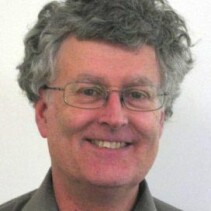
Professor Geoff Jameson
Emeritus Investigator
- Phone:
- +64 6 356 9099, ext. 84626
Address:
Institute of Fundamental Sciences
Massey University
Riddet Road
Private Bag 11 222
Palmerston North 4442
Biography
Geoff Jameson received his BSc Hons (1974) and PhD degrees (1977) from the University of Canterbury, under the mentorship of Ward Robinson and the late Gordon Rodley on the structural chemistry of picket-fence porphyrins.
Following postdoctoral positions at Northwestern Univeristy (bioinorganic chemistry) and University of Zürich (chemistry within the solid state) and a tenured position at Georgetown University (bioinorganic and magneto-chemistry), he returned to New Zealand, joining Massey University in 1994 and moved into structural biology, becoming Professor in Structural Chemistry and Biology in 2001.
He was elected a Fellow of the Royal Society of New Zealand, awarded the SGS Prize of the New Zealand Institute of Chemistry and selected as the RSC Australasian Lecturer in 2003. In 2010, he was awarded the Massey University Research Medal (Individual) and in 2011 the Marsden Medal of the New Zealand Association of Scientists.
Along the way, he has published over 230 papers and book chapters, helped with NZ’s investment, capability building and access to the Australian Synchrotron (on-going as a Director of the NZ Synchrotron Group Ltd and Chair of the Access Committee), secured funding for NZ’s highest field NMR spectrometer, the Bruker 700 MHz with Cryoprobe (upgraded in 2021), advised on equipment purchases to maintain NZ’s leading single-crystal X-ray diffraction facility, and contributed fully to teaching at all levels.
In addition to being an Associate Investigator in the MacDiarmid Institute, he is an AI of the Maurice Wilkins Centre for Molecular BioDiscovery and the Biomolecular Interactions Centre, and a Principal Investigator in the Riddet Institute.
In July 2021, he become Professor Emeritus, but remains fully active in research and contract teaching.
Research interests
Geoff enjoys some notoriety for work on pathological crystal structures, both protein and small(ish) molecules.
Research interests span solid-state chemistry to enzyme structure and function (superoxide dismutases and enzymes from metabolic pathways present in microorganisms but not in humans) to biophysical properties of food components and modifiers (β-lactoglobulin and pectin/pectin methylesterase) and to origin of life studies on the chemical and physical behaviour of RNA and its components at extremes of pressure and temperature.
This latter is concomitant with the development of high-pressure/high-temperature NMR capability at Massey University.
I am increasingly interested in the role that entropy, the "dynamics of thermodynamics", plays in protein structure and function. Nuclear Magnetic Resonance techniques and molecular dynamics simulations give insight into this fourth dimension of time.
Professor Geoff Jameson
In the news

Annual Report
2023 Funding successes - Annual Report 2023
April 13, 2024
Funding successes for our Investigators and their research programmes during 2023.

Annual Report
Patent applications - Annual Report 2022
April 20, 2023
One of the early considerations on the path to market for materials science is what should be patented and why.

Annual Report
Funding successes - Annual Report 2022
April 19, 2023
Funding successes for our investigators and their research programmes during 2022. This funding enables our researchers and collaborators to continue their breakthrough research in advanced materials and nanotechnology.

News Article
2022 MacDiarmid Institute Marsden grant successes
November 3, 2022
MacDiarmid Institute led research received $7.84 million funding in 2022 Te Pūtea Rangahau a Marsden, the Marsden Fund.
Read more about 2022 MacDiarmid Institute Marsden grant successes

Annual Report
Funding successes - Annual Report 2021
May 9, 2022
Funding successes for our investigators and their research programmes during 2021. This funding enables our researchers and collaborators to continue their breakthrough research in advanced materials and nanotechnology.

Annual Report
Patents and Spinouts 2019 - Annual Report 2019
May 27, 2020
This article from our 2019 Annual Report provides information about the MacDiarmid Institute's latest inventions, patents and spinouts.
Read more about Patents and Spinouts 2019 - Annual Report 2019

Annual Report
Funding successes - Annual Report 2019
May 26, 2020
Funding successes for our investigators and their research programmes during 2019. This funding enables our researchers and collaborators to continue their breakthrough research in advanced materials and nanotechnology.

Annual Report
2018 funding successes - Annual Report 2018
April 8, 2019
Funding successes for our investigators and their research programmes during 2018. This funding enables our researchers and collaborators to continue their breakthrough research in advanced materials and nanotechnology.


